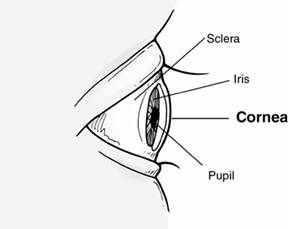
CORNEAL ABRASION
What is a corneal abrasion?
A corneal abrasion is a scratch on the surface of the cornea. The cornea is the clear outer layer on the front of the eye.
How does it occur?
Corneal abrasions can be caused by:
- A sports injury. This can happen in sports when a player gets hit in the eye with the ball.
- A tiny object that gets in your eye. The object may come out in your tears, or your doctor may need to remove it.
- An object that scratches your eye. You may scratch your eye with something such as a fingernail, branch, piece of paper, or comb.
- Problems with contact lenses. Gas permeable contacts may become chipped or cracked and scratch your eye. Wearing contact lenses too long can also cause an abrasion. Soft contacts can cause eye infections if they are not kept sterile, and eye infections can cause corneal abrasion.
What are the symptoms?
Symptoms may include:
- redness
- tearing
- pain
- a scratchy feeling
- sensitivity to light
- blurry vision

How is it diagnosed?
Your doctor will ask about your symptoms and ask if you know how your eye was scratched. Using special eyedrops and a light that makes an abrasion easier to see, your doctor will look at your eye. The drops are a painless dye that will make your vision yellow for a few minutes.
How is it treated?
If something is still in your eye, your doctor will flush it out with water or remove it with a swab or needle (after numbing your eye with a drop of anesthetic). Your doctor may give you antibiotic drops or ointment to use for several days, and want to see you frequently until your eye is healed.
How long will the effects last?
Most corneal abrasions heal in a day or two. If your symptoms last longer than that, see your doctor again because you may have a more serious problem.
How can I help prevent a corneal abrasion?
- Always wear goggles, safety glasses, or eye shields at work or when playing sports where your eyes could be injured.
Follow your doctor's instructions for wearing and caring for contact lenses. Do not wear them longer than recommended.
This content is reviewed periodically and is subject to change as new health information becomes available. The information is intended to inform and educate and is not a replacement for medical evaluation, advice, diagnosis or treatment by a healthcare professional.
